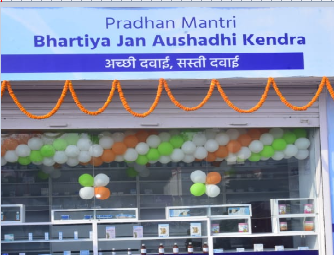
(Photo : X.com)
India's Generic Pharmacy Model Goes Global
- India's affordable generic pharmacy model is gaining global interest, with over ten countries considering its adoption.
- The Jan Aushadhi Kendras, part of a public welfare scheme, provide quality medicines at affordable prices.
- The Union government aims to open 25,000 Jan Aushadhi Kendras across India by March 2026.
- The international interest in India's model is a testament to its success and potential to transform healthcare in developing countries.
India's generic pharmacy model, a beacon of affordable healthcare, is gaining international recognition. Over ten countries, including Sri Lanka, Afghanistan, Nepal, Bhutan, Ghana, Suriname, Nicaragua, Mozambique, the Solomon Islands, and even Taliban-ruled Afghanistan, are reportedly considering its adoption. This model, instrumental in making cost-effective medicines available to the public, is being eyed by these nations to improve their healthcare systems.
In July, Mauritius became the first country to launch the International Janaushadhi Kendra. This initiative allows the island nation to source approximately 250 high-quality medicines from the Pharmaceuticals and Medical Devices Bureau of India. The range of medicines includes cardiovascular, analgesic, ophthalmic, and anti-allergic drugs, among others.
The Rise of Jan Aushadhi Kendras
The Jan Aushadhi Kendras, or generic drug stores, are part of the Pradhan Mantri Bharatiya Janaushadhi Pariyojana (PMBJP). This public welfare scheme was launched by the Narendra Modi-led Central government in November 2008. The primary objective of the scheme is to provide quality medicines at affordable prices to the masses through these special centers.
The growth of the Jan Aushadhi Kendras has been remarkable. In 2014, there were only 80 such Kendras in India. Fast forward to September 2024, and the number has swelled to a staggering 13,822 across the country, according to official data. This expansion has been accompanied by a surge in sales. In September alone, these Kendras achieved record sales of Rs 200 crore, marking the highest monthly sales in the history of the PMBJP.
Affordable Healthcare: A Global Appeal
Over the past decade, medicines worth Rs. 6100 crores have been sold through these Kendras, resulting in estimated savings of Rs. 30,000 crore for the public. The price of medicines, surgical devices, and nutraceutical products at the Jan Aushadhi Kendras is at least 50 per cent cheaper than the market price of branded medicines. In some cases, the price difference is as high as 80 to 90 per cent.
The Union government has set an ambitious target of opening 25,000 Jan Aushadhi Kendras across the country by March 2026. This move is expected to further enhance the accessibility of affordable medicines to the public. Meanwhile, countries like Burkina Faso, Fiji Islands, and Saint Kitts and Nevis are reportedly in talks with the Indian government to help them replicate the scheme.
* This is a contributed article and this content does not necessarily represent the views of btin.co.in









